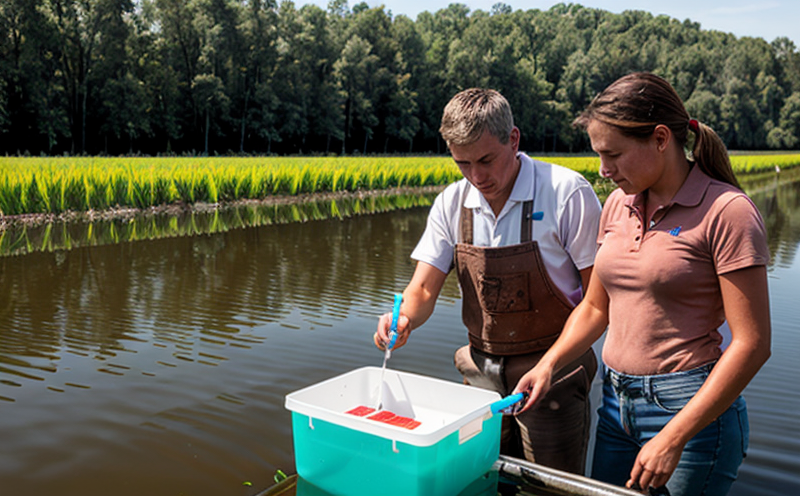Chloride Ion Testing in Irrigation Water
In agriculture and forestry testing, ensuring the quality of irrigation water is paramount to sustainable crop production. Chloride ion testing plays a crucial role in monitoring the chemical composition of irrigation water. Excessive chloride levels can lead to soil degradation, affect plant health, and potentially cause harm if consumed by humans or animals through contaminated produce.
The presence of chloride ions (Cl-) is often an indicator of salinity, which can be detrimental to crops. Chloride can come from various sources such as fertilizers, natural soil salts, and contamination from industrial waste. Accurate chloride ion testing helps farmers make informed decisions about water usage, thereby optimizing crop yields while minimizing environmental impact.
The process involves the collection of irrigation water samples followed by their analysis using appropriate analytical techniques. Precision in sample preparation is critical to ensure reliable test results. Proper handling prevents contamination and ensures that the chloride levels accurately reflect the conditions within the irrigation system.
Understanding the role of chloride ions in soil chemistry helps in determining safe thresholds for irrigation. Agricultural standards such as ISO 8406:2017 provide guidelines on acceptable levels of chloride to avoid adverse effects on crops. These standards are widely recognized and adopted by various sectors including agriculture, forestry, and environmental protection.
Water quality testing laboratories like Eurolab offer comprehensive services for chloride ion analysis in irrigation water. Our expertise lies in providing accurate and timely results using state-of-the-art instruments. We adhere to strict methodologies that ensure consistency and reliability of our findings.
| Parameter | Description |
|---|---|
| Sample Collection | Water samples should be collected from multiple points in the irrigation system using sterile containers to prevent contamination. |
| Analytical Method | The Potentiometric Titration method as per ISO 8406:2017 is commonly used for chloride ion determination. |
Our team of experienced professionals ensures that every step in the testing process adheres to international standards. This not only guarantees accuracy but also helps our clients meet regulatory requirements and industry best practices.
In conclusion, accurate chloride ion testing is essential for maintaining healthy crops and sustainable agricultural practices. By leveraging Eurolab's expertise, you can trust in getting reliable data that informs critical decisions regarding your irrigation water quality.
Scope and Methodology
| Test Parameter | Description |
|---|---|
| Clinical Grade Water Samples | Water samples are collected from various points in the irrigation system using sterile containers to prevent contamination. |
| Analytical Techniques | The Potentiometric Titration method as per ISO 8406:2017 is used for chloride ion determination. This involves titrating a known volume of water with standard silver nitrate solution until the endpoint is reached, indicating complete precipitation. |
| Acceptance Criteria | The maximum allowable chloride concentration in irrigation water according to ISO 8406:2017 should not exceed 500 mg/L for most crops. However, specific thresholds may vary based on crop type and soil conditions. |
Our methodology ensures that all tests are conducted under controlled conditions, minimizing variability in results. By adhering to these rigorous standards, we provide accurate and precise chloride ion testing services tailored specifically for agricultural applications.
Eurolab Advantages
At Eurolab, we pride ourselves on delivering exceptional quality testing services backed by years of experience in the field. Our advanced laboratory facilities equipped with cutting-edge instrumentation enable us to perform chloride ion tests with high precision and accuracy.
- Comprehensive Testing Capabilities: We offer a wide range of testing options beyond just chloride ions, including pH levels, nutrient content, and microbial contamination checks.
- Expertise in Agriculture: Our team of experts has extensive knowledge specifically tailored to the agricultural sector ensuring that our clients receive relevant insights based on their unique needs.
- State-of-the-Art Equipment: Utilizing up-to-date technology allows us to deliver rapid turnaround times without compromising on quality, making it easier for you to make informed decisions promptly.
- Accurate Results: By following internationally recognized standards like ISO 8406:2017, we ensure that all our findings are reliable and repeatable, giving you confidence in the information provided.
These advantages set Eurolab apart as your trusted partner for chloride ion testing services. Whether you need regular monitoring or one-off analysis, our commitment to excellence ensures satisfaction every time.
Competitive Advantage and Market Impact
The demand for sustainable agricultural practices continues to grow, driven by increasing global population pressures and changing consumer preferences towards healthier food options. Ensuring optimal irrigation water quality is a key component of this trend. By offering chloride ion testing services that adhere strictly to international standards, Eurolab positions itself at the forefront of this movement.
Our service not only helps individual farmers but also contributes significantly to broader industry goals such as reducing environmental impact and promoting healthier crop production methods. Through accurate and timely analysis, we empower decision-makers within agricultural organizations to implement effective strategies that enhance productivity while protecting natural resources.
The competitive edge provided by Eurolab's chloride ion testing services extends far beyond mere compliance with regulations. By providing actionable insights based on our findings, we enable stakeholders across the supply chain—from producers to retailers—to contribute positively towards achieving sustainable agriculture goals.





